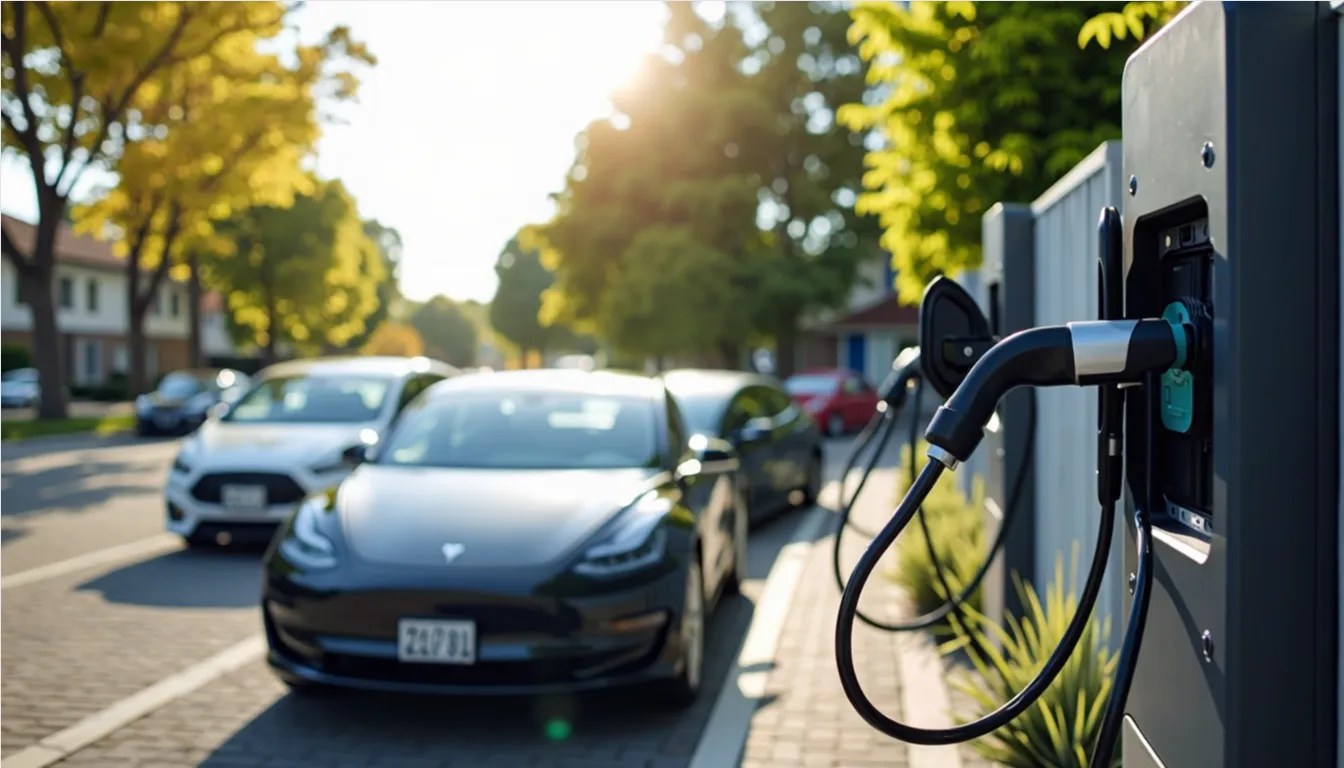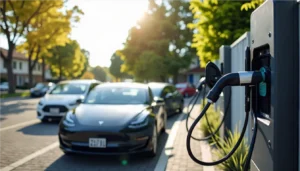Reliable and Fast EV Charger Installation Services by Green Spark Electrics
Key Takeaways
- Green Spark Electrics offers accredited installation services, ensuring compliance with IET codes and safety regulations for EV chargers.
- Their team consists of certified electricians accredited by Napit or NICEIC, guaranteeing professional and reliable service.
- They specialize in installing 7.4kW chargers, capable of fully charging a 74kWh battery in under 10 hours.
- Green Spark Electrics assists customers in accessing available grants, such as the £350 OZEV grant for home installations.
- They provide smart charger options with WiFi capabilities, allowing users to monitor and optimize charging via mobile apps.
Overview of EV Charger Installation
As the UK government accelerates its push for full electric vehicle adoption by 2030, the need for efficient EV charger installations has become increasingly crucial. Homeowners are now seeking reliable local EV installers, as home charging points offer unparalleled convenience and efficiency. The typical installation cost for a recommended 7.4kW charger ranges from £750 to £950, providing smart charging capabilities ideal for overnight use. With the average home charging cost around £13, usually during off-peak tariffs, it’s an economically sound option. Compliance with safety standards is non-negotiable; installations must be carried out by qualified electricians, adhering to IET codes of practice. This ensures not only optimal performance but also the safety of users and their properties, fostering confidence in EV technology.
Choosing the Right Charger
When selecting an EV charger, understanding the various types available is essential for informed decision-making. Key features such as charging speed, smart capabilities, and compliance with safety regulations must be evaluated to ensure compatibility with the user’s vehicle and home setup. Additionally, installation costs and professional services should be factored into the overall budget for a seamless charging solution.
Charger Types Overview
Choosing the right EV charger involves understanding the various types available and their respective benefits. In the UK, a 7.4kW charger is optimal for home use, fully charging a 74kWh battery in under 10 hours, making it perfect for overnight charging. Users can choose tethered chargers, which have built-in cables for convenience, or untethered chargers, offering flexibility for different vehicle types. Smart chargers, equipped with WiFi, allow for monitoring and optimization through mobile apps, potentially reducing costs by utilizing off-peak tariffs. It’s crucial to consider charging speeds; a 3.7kW charger may take up to 20 hours for a full charge, which is inefficient for daily use. Always ensure selected chargers comply with IET codes for safety and effectiveness.
Key Features to Consider
Selecting the right EV charger involves careful consideration of several key features that can significantly impact both usability and efficiency. A 7.4kW model is recommended for optimal overnight charging, fully replenishing a 74kWh battery in under 10 hours. Smart charging capabilities are essential, allowing users to monitor charging via mobile apps and optimize usage during off-peak hours for cost savings. Evaluating the type of charger is crucial; tethered options offer convenience, while untethered chargers provide flexibility for various vehicles. Additionally, ensure compliance with IET codes of practice and that installations are performed by qualified electricians possessing certifications like the C&G 2921-34 EV charging qualification, ensuring safety and reliability in your investment.
Cost and Installation Factors
While understanding the cost implications and installation factors associated with EV chargers, it’s crucial to recognize that a well-chosen model can enhance both efficiency and convenience. A 7.4kW charger, recommended for home use, typically costs between £750 and £950 for installation. This model is particularly effective for overnight charging, fully replenishing a 74kWh battery in under 10 hours. Additionally, charging at home with this unit averages around £13 per full charge, making it cost-effective, especially during off-peak hours. To ensure safe installation, selecting a qualified installer with the C&G 2921-34 EV charging qualification is essential, along with adherence to IET codes of practice. This meticulous approach guarantees both safety and optimal performance for EV owners.
Charging Time and Cost Efficiency
Charging time and cost efficiency are critical factors for EV owners considering home installations. A standard 7.4kW charger can fully charge a 74kWh battery in under 10 hours, allowing users to leverage lower off-peak electricity rates for significant savings. By optimizing charging times with smart technology, users can further enhance cost-effectiveness while enjoying the convenience of home charging solutions.
Charging Speed Comparison
How does the charging speed of an EV charger influence both charging time and cost efficiency? A 7.4kW home charger can fully charge a 74kWh battery in under 10 hours, while a 3.7kW charger requires about 20 hours. This stark difference illustrates how charging speed directly affects time management for EV owners. Faster chargers not only reduce charging duration but also enhance cost efficiency, especially when utilized during off-peak hours. Home charging can cost around £13 per full charge, making it financially advantageous. Furthermore, smart chargers optimize this process, ensuring vehicles are ready by morning without incurring high expenses. For businesses, implementing faster chargers (22kW AC to 240kW DC) can significantly boost customer satisfaction and revenue through EV charging services.
Cost-Effective Charging Solutions
The choice of an EV charger significantly impacts both charging time and cost efficiency, making it imperative for homeowners and businesses to evaluate their options carefully. A standard 7.4kW home charger can fully charge a 74kWh electric vehicle battery in under 10 hours, ideal for overnight charging. At an off-peak rate of 7.5p per kWh, a full charge typically costs around £13, markedly more cost-effective than public charging stations. Smart chargers enhance this by optimizing charging during off-peak hours, further reducing costs. Additionally, the OZEV grant can subsidize installation by up to £350, making it an even more economical solution. This approach not only saves money but also ensures electric vehicles are always ready for use, providing users with greater freedom.
Installation Requirements and Compliance
When installing an EV charger, collaborating with approved electricians is crucial to ensure safety and compliance with electrical standards. DIY installations can introduce significant safety hazards due to a lack of proper testing equipment. It’s vital to verify that installers are accredited by recognized bodies such as Napit or NICEIC and possess the C&G 2921-34 EV charging qualification. Compliance with IET codes of practice is essential; this may include conducting an Electrical Installation Condition Report (EICR) if the consumer unit is in poor condition. Additionally, all copper pipes and metal steelwork must be adequately earthed to enhance safety. Finally, notifying the Distribution Network Operator (DNO) ensures that the installation adheres to local electrical regulations and grid compatibility requirements.
The Installation Process at Green Spark Electrics
Prioritizing efficiency and safety, Green Spark Electrics has streamlined its EV charger installation process to deliver high-quality service with minimal disruption. Starting at £299, the installation is completed within 2-4 hours, ensuring that daily routines remain largely uninterrupted. Each installation is executed by qualified approved fitters, who undergo regular training to stay abreast of the latest safety practices and technologies. Comprehensive safety checks and certification are integral to the process, aligning with industry standards and regulations. To enhance customer confidence, Green Spark Electrics includes insurance coverage for installations, offering liability insurance for added peace of mind. This meticulous approach guarantees a reliable and safe installation experience for every customer seeking freedom in their electric vehicle journey.
Business EV Charging Solutions
Businesses increasingly recognize the importance of integrating EV charging solutions into their operational framework. Green Spark Electrics provides a diverse range of options, from 22kW AC fast chargers to 240kW DC chargers, tailored for various commercial applications. By implementing these solutions, organizations can significantly lower their carbon footprint, aligning with sustainability initiatives and enhancing corporate responsibility. Additionally, utilizing the Workplace Charging Scheme allows businesses to access a £350 grant per installation, making the infrastructure more affordable. Offering EV charging services not only supports employees and customers but also generates a secondary income stream. Green Spark Electrics ensures that all installations meet industry standards, including rigorous safety checks and certifications, thereby guaranteeing reliable operation and peace of mind for businesses.
Available Grants and Financial Assistance
How can homeowners and businesses capitalize on available financial assistance to ease the transition to electric vehicle (EV) infrastructure? The Office for Zero Emission Vehicles (OZEV) provides a grant of £350 for eligible home EV charger installations, significantly lowering upfront expenses. For businesses, the Workplace Charging Scheme offers grants of £350 per charge point, facilitating the shift towards comprehensive EV infrastructure. These financial incentives encourage the adoption of EV charging solutions in diverse environments. To qualify for OZEV grants, it’s crucial to verify the installer’s credentials via the official OZEV website. By leveraging these grants, both homeowners and businesses can reduce installation costs while playing a vital role in sustainability efforts and minimizing their carbon footprint.
Frequently Asked Questions
What Types of Electric Vehicles Are Compatible With Your Chargers?
The chargers are compatible with various electric vehicles, including popular models from manufacturers like Tesla, Nissan, BMW, and Volkswagen. They support Type 2 connectors, ensuring flexibility for different EV designs and optimizing charging efficiency.
Do You Offer Maintenance Services for Installed EV Chargers?
In the realm of electric mobility, they’ve got maintenance services covered. Their tailored checks ensure chargers run smoothly, identifying issues before they arise, offering customers peace of mind and enhancing their charging freedom.
Can I Install a Charger in a Rental Property?
Installing a charger in a rental property typically requires landlord approval. Tenants should discuss charger types and potential property impacts, ensuring compliance with safety standards, while also considering grants to help offset installation costs.
What Warranties Do You Provide on Your Installation Services?
Like a safety net for acrobats, their installation services come with a comprehensive warranty covering parts and labor for a specified duration, ensuring clients’ peace of mind while adhering to strict industry standards and regulations.
How Do I Schedule an Installation Appointment?
To schedule an installation appointment, one can complete the online survey form on the website anytime. Alternatively, booking a personalized survey with an expert ensures tailored recommendations for suitable EV charging solutions.
Conclusion
In the evolving landscape of electric vehicle adoption, Green Spark Electrics stands as a beacon of efficiency and expertise. Their meticulous installation process transforms ordinary garages into powerful charging hubs, ensuring every 74kWh battery is revitalized in under 10 hours. With their commitment to safety and compliance, they illuminate the path toward a sustainable future. By facilitating access to financial incentives, Green Spark Electrics not only powers vehicles but also empowers homeowners, making the journey toward greener living seamless and rewarding.













Post Comment